ISLAMABAD: Minister for Interior Sheikh Rashid Ahmed said on Sunday the speaker of Pakistan’s lower house of parliament would decide after March 15 when to convene a session on the no-confidence vote against the prime minister.
Pakistan’s leading opposition parties announced last month they would topple the Prime Minister Imran Khan-led government by filing a vote of no-confidence against him in parliament. Last week, opposition legislators formally submitted the motion with the National Assembly.
The political temperature in the country has been on the rise since, with the prime minister looking to court disgruntled legislators from within his party and strengthen his ties with coalition partners, the Pakistan Muslim League-Quaid-e-Azam (PML-Q) and the Karachi-based Muttahida Quami Movement-Pakistan (MQM-P) before the important vote gets underway.
Both the opposition and the government say they have the required numbers to win the no-confidence vote.
“God willing, after March 15, Prime Minister Imran Khan’s position will be further strengthened,” Ahmed said, speaking at a ceremony organized by the Women Business Forum in Islamabad.
“It is up to the speaker to decide when he wants to convene the session [of the National Assembly] and he will make that decision after March 15,” he said, adding that the speaker’s decision cannot be challenged by anyone.
Referring to the government’s allies, Ahmed said friends should “offer their support” in difficult times. “I am standing with Imran Khan like a rock,” he said.
The minister also spoke about women’s empowerment at the event, urging the Women Business Forum to create opportunities for women from Pakistan’s Sindh, Balochistan and other provinces where poverty was rife and opportunities were scarce.
“I want you to expand and open more bazaars. The entire city of Islamabad is an open field. Whatever you think you can improve, we are ready to provide you [with the necessary tools] for that,” he said.
Speaker to decide on convening parliamentary session on no-confidence vote after March 15 — interior minister
https://arab.news/cevqv
Speaker to decide on convening parliamentary session on no-confidence vote after March 15 — interior minister
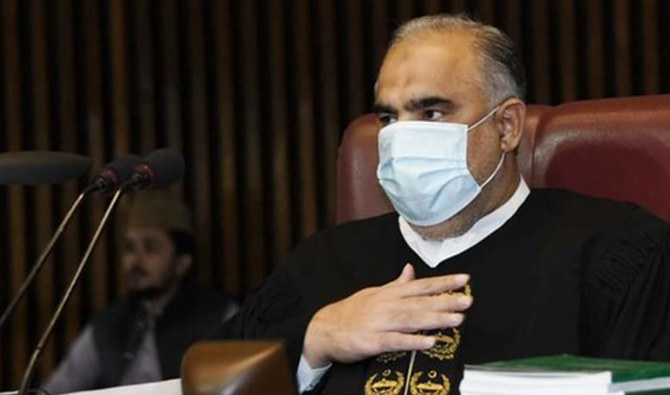
- Opposition parties have filed a motion of no-confidence against PM Imran Khan
- After March 15, Khan’s position will be strengthened, says interior minister
Pakistan approves $8 million to pay severance packages of PIA-owned Roosevelt Hotel in New York

- Pakistan’s national airline bought the Roosevelt Hotel in 1999 for $36.5 million
- Islamabad is pushing for privatization of state entities for a fresh IMF bailout
ISLAMABAD: The Pakistani government on Thursday approved $8 million to pay severance packages of the Pakistan International Airlines-owned Roosevelt Hotel in New York, Pakistani state media reported, amid the South Asian country’s push for privatization of state entities.
The development came at an ECC meeting presided over by Finance Minister Muhammad Aurangzeb, during which the Ministry of Aviation presented a summary to allow the utilization of $8 million available with National Bank of Pakistan to pay severance packages of the establishment.
Roosevelt Hotel, a 19-story building located at a prime location in New York, was inaugurated in Manhattan on September 22, 1924. Named after the 26th President of the United States, Theodore Roosevelt, Pakistan’s national airline leased it in 1979 through the Pakistan International Airlines Investments Limited (PIA-IL).
Saudi Prince Faisal bin Khalid bin Abdulaziz Al-Saud was also one of the investors in the 1979 investment deal, though the PIA decided to buy the hotel for $36.5 million in 1999 and later struck a deal with its Saudi partner in 2005 to buy his share in the property as well.
“The Economic Coordination Committee (ECC) of the Cabinet on Thursday approved $8 million to pay severance packages and operational expenses of the Roosevelt Hotel,” the state-run APP news agency reported.
In 2021, the government of then prime minister Imran Khan had allowed the release of $27.3 million for the payment of liabilities accumulated by the hotel, which permanently closed its door on October 31, 2020, after remaining operational since 1924.
A year earlier, it had also approved $142 million for the PIA-IL last year to meet the hotel’s financial challenges.
The $8 million severance grant comes amid Pakistan’s push for privatization and reforms in state-owned enterprises (SOEs) as it negotiates with the International Monetary Fund (IMF) a fresh bailout program, for which Islamabad must implement an ambitious reforms agenda, including the privatization of debt-ridden SOEs.
Among the main entities Pakistan is pushing to privatize is its national flag carrier, the Pakistan International Airlines (PIA), while the government is putting on the block a stake ranging from 51 percent to 100 percent.
The South Asian country, which has been facing low foreign exchange reserves, currency devaluation and high inflation, last month completed a short-term $3 billion IMF program that helped stave off a sovereign default, but the government of Prime Minister Shehbaz Sharif has stressed the need for a fresh, longer-term program to keep the $350 billion economy afloat.
First batch of Pakistani Hajj pilgrims arrives in Jeddah
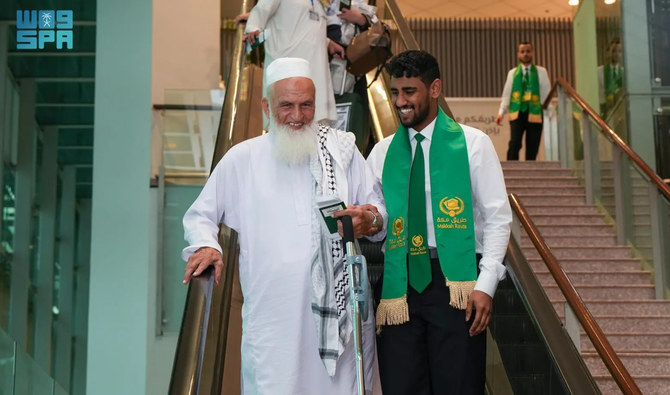
- A total of 34,316 Pakistanis reached Madinah by May 23 in first phase of Pakistan’s pre-Hajj flight operation
- As many as 114 flights will be transporting another 34,422 Pakistani pilgrims to Jeddah from May 24 to June 9
ISLAMABAD: The first batch of 720 Pakistani Hajj pilgrims arrived in Jeddah on Friday, Pakistani state media reported, a day after Pakistan diverted its pre-Hajj flights from Madinah.
Hajj is one of the five pillars of Islam and requires every adult Muslim to undertake the journey to the holy Islamic sites in Makkah at least once in their lifetime if they are financially and physically able.
These 720 Pakistani pilgrims departed from Islamabad and Karachi under the Makkah Route initiative and arrived via Saudia airline flights that landed at the King Abdulaziz International Airport, the APP news agency reported.
“The first flight SV-3705, with 370 passengers on board, arrived by 5 a.m. (local time) and the second SV-3727 landed at 6:10 a.m. carrying 350 Hajj pilgrims,” the report read.
Head of Pakistan Hajj Mission Abdul Wahab Soomro, Consul General Khalid Majeed and senior officials of the Pakistani Ministry of Religious Affairs as well as representatives of the Saudi government welcomed the pilgrims.
Under the Makkah Route initiative, the passengers directly left for their hotels avoiding long queues at the immigration counters and their luggage was shifted automatically to their residences.
In the first phase of Pakistan’s pre-Hajj flight operation, a total of 34,316 Pakistanis reached Madinah by May 23 through 146 flights, according to the report.
From May 24 to June 09, as many as 114 flights will be transporting 34,422 Pakistanis to Jeddah.
Pakistan has a Hajj quota of 179,210 pilgrims this year, of which 63,805 people will perform the pilgrimage under the government scheme, while the rest will use private tour operators.
This year’s pilgrimage is expected to run from June 14 till June 19.
Security of Chinese workers tops agenda as Islamabad, Beijing hold key investment meeting
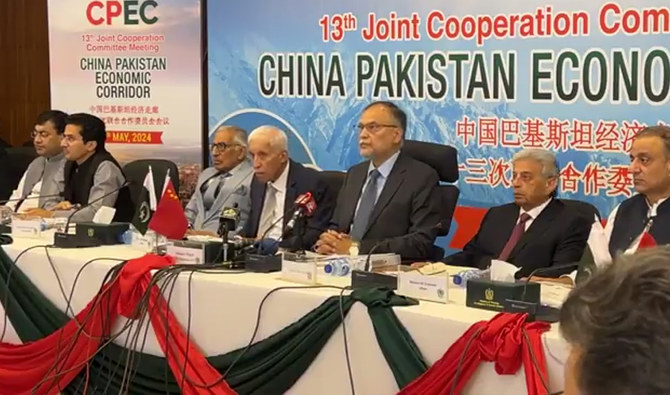
- Joint Cooperation Committee is main decision-making body for CPEC and convenes annually
- Five Chinese workers, Pakistani driver were killed in suicide attack on their vehicle on March 26
KARACHI: Pakistan and China are holding a virtual meeting of the 13th Joint Cooperation Committee (JCC) on the China-Pakistan Economic Corridor (CPEC) today, Friday, with the security of Chinese organizations and personnel working in the South Asian nation expected to be at the top of the agenda.
China is a major ally and investor in Pakistan but both separatist and other militants have attacked Chinese projects over recent years and killed Chinese personnel, including five Chinese workers who perished in a suicide attack Mar. 26 while they were on their way to the Dasu hydropower project in Pakistan’s northwestern Khyber Pakhtunkhwa province.
The hydropower project falls under the ambit of the China-Pakistan Economic Corridor (CPEC), a flagship of China’s Belt and Road Initiative through which it has pledged more than $65 billion for road, rail and other infrastructure developments in the South Asian nation of 241 million people.
Beijing has also over the years readily provided financial assistance to bail out its often-struggling neighbor, including in July last year when China granted Pakistan a two-year rollover on a $2.4 billion loan, giving the debt-saddled nation much-needed breathing space as it tackled a balance-of-payments crisis.
“The 13th Joint Cooperation Committee (JCC) meeting of the China-Pakistan Economic Corridor (CPEC) has formally started with a one-minute silence in honor of the Chinese officials who lost their lives in a recent suicide bomb blast,” Pakistan’s planning ministry said in a statement on X.
“Chinese workers in Pakistan are heroes of Pakistan, whose contributions significantly support the realization of the China-Pakistan Economic Corridor initiative.”
The JCC is the main decision-making body for CPEC, which convenes annually. The MoU to launch CPEC was signed between Pakistan and China on July 5, 2013. Pakistan has said more than 50 projects worth $25 billion under the CPEC umbrella have been completed since.
But Chinese projects and interests have also increasingly come under attack in recent years. The Dasu assault in March was the third major one in a little over a week on China’s interests and followed a Mar. 20 attack on a strategic port used by China in the southwestern province of Balochistan, where Beijing has poured billions of dollars into infrastructure projects, and a Mar. 25 assault on a naval air base, also in the southwest.
Both attacks were claimed by the Baloch Liberation Army (BLA), the most prominent of several separatist groups in Balochistan.
Dasu, the site of a major dam, has been attacked in the past, with a bus blast in 2021 killing 13 people, nine Chinese among them, although no group claimed responsibility, like the Mar. 26 bombing.
Pakistan is home to twin insurgencies, one mounted by religiously-motivated militants and the other by ethnic separatists who seek secession, blaming the government’s inequitable division of natural resources in southwestern Balochistan province.
Chinese interests are mostly under attack primarily by ethnic militants seeking to push Beijing out of mineral-rich Balochistan, but that area is far from the site of the Mar. 26 bombing.
On Thursday, Pakistan’s top economic body approved $2.5 million in compensation for families of Chinese workers who were killed in the Mar. 26 Dasu attack.
Authorities demolish part of Imran Khan’s Islamabad party office for ‘violating’ bylaws
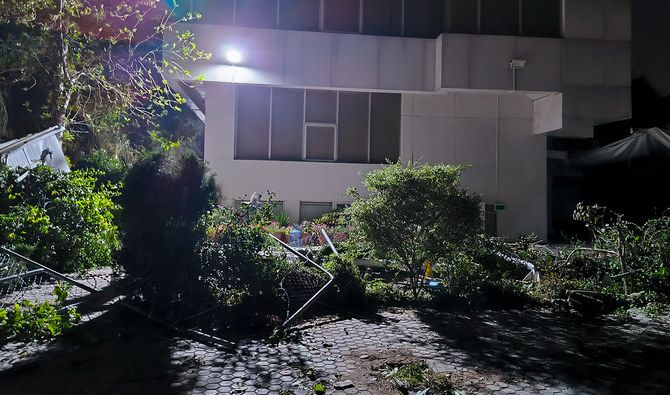
- Pakistan Tehreek-e-Insaf calls move ‘patently illegal and unlawful’
- PTI has complained of a widening state-backed crackdown on the party
ISLAMABAD: Local authorities on Thursday razed part of the Islamabad office of former prime minister Imran Khan’s Pakistan Tehreek-e-Insaf (PTI) over what they said was a “violation” of building by-laws, with the party calling on the top court to restrain authorities from doing ‘irreparable’ damage.
Officials and staff of the Capital Development Authority (CDA) arrived at the PTI Central Secretariat in the G-8/4 sector along with heavy machinery late on Thursday night and removed two shipping containers placed outside the building, as well as took down a guard room and a fence. They then sealed the office for alleged violations of city building bylaws.
“CDA operation over violations of building by-laws and to eliminate illegal constructions and encroachments,” the authority said on X. “Encroachments and illegal constructions on a plot by a political party in Sector G-8/4 are being removed.”
Sayed Zulfikar Bukhari, a senior spokesperson for the PTI and close Khan aide, said the party was neither served a notice, nor granted the opportunity for a hearing.
“This is patently illegal and unlawful,” he said in a statement. “We don’t have time to file a petition at this point of time. The Hon’ble CJ SCP [chief justice of the Supreme Court of Pakistan] may consider this message as an urgent application and direct Islamabad administration to refrain from causing such irreparable loss to the party.”
The PTI says it has been facing a state-backed crackdown, especially after May 9 last year when alleged Khan supporters ransacked government and military properties after the leader’s brief arrest on graft charges.
Hundreds of PTI supporters and leaders were arrested following the riots and many continue to remain behind bars as they await trial. The military has also initiated army court trials of at least 103 people accused of involvement in the violence. Many close Khan aides have since deserted him, due to what is widely believed to be pressure from the army, which denies interfering.
Khan, who was ousted in a parliamentary no-trust vote in April 2022, has been in jail since last August and convicted in four cases. He and the PTI say the May riots have been used as a ruse by political rivals and the military to weaken the party, which is arguably the most popular in Pakistan. Khan also says all cases against him are politically motivated and accuses the country’s powerful military and his political rivals of trying to keep him out of politics, an allegation they both deny.
Pakistan considers changing women’s passport policy amid row over including husband’s name
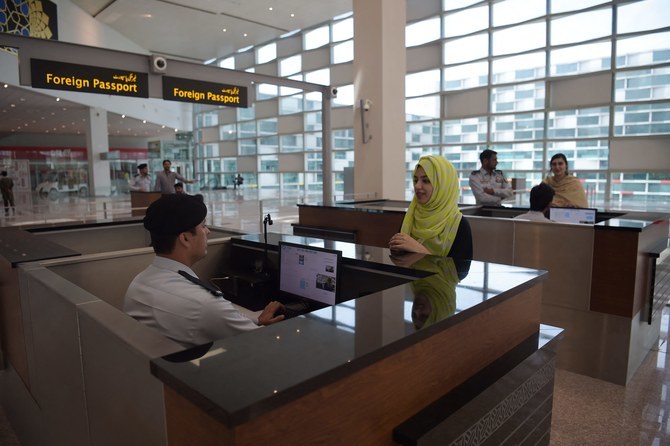
- NADRA allows women to retain father’s name on CNICs but passport authorities mandate changing to husband’s name
- Lawyer Khadija Bukhari has petitioned court saying women be allowed to retain father’s name whether married or divorced
ISLAMABAD: The Pakistan government is considering modifying its passport policy for married and divorced women, a senior official said on Thursday, after a lawyer petitioned a local court against the requirement to include the husband’s name on the travel document.
Lawyer Khadija Bukhari has pointed out the contrition in the policies of the National Database and Registration Authority (Nadra) and the Directorate General Immigration & Passports (DGIP) regarding married women.
The former allows women to retain their father’s name even after marriage while updating their marital status on their Computerized National Identity Card (CNIC), but the passport authority has made it mandatory to change the name from father to husband. However, because the passport is made on the basis of NADRA data, a woman who has not switched to her husband’s name on her CNIC must get a new CNIC made reflecting the change before she can be issued a new passport.
Speaking to Arab News, Bukhari said she had her husband’s name included in her CNIC data in order for their marriage to be registered with NADRA, but later decided to retain her father’s name in the second column of her CNIC.
“So, there was no problem with that. But once I went to the passport office when my passport expired, they said, ‘We cannot renew your passport because your CNIC has not been updated’,” she told Arab News.
“By that it was meant that ‘You’re supposed to be wife of someone, you cannot remain a daughter if you want to get a passport. So first go back to NADRA, get your CNIC changed and reflect that you are the wife of someone and then we will process your application’.”
Bukhari argued that if NADRA didn’t have a problem with women retaining their father’s name then why did the passport authority have a separate policy.
Immigration and Passports Director-General Mustafa Jamal Kazi told Arab News it was currently a “legal requirement” for a married woman to have her husband’s name on her passport as the document was used internationally and must comply with international agreements, unlike NADRA-issued CNICs that were used only in Pakistan.
“These rules are driven through the act of parliament and secretary interior has constituted a committee under his chairmanship to solve this issue. The committee will look into the passport policy concerning the condition of a married woman’s passport bearing her husband’s name instead of her father’s name,” Kazi said.
“The committee was tasked with addressing discrepancies between the policies of the National Database and Registration Authority and the passport issuing authority regarding married women.”
Kazi said the solution to the problem, which he also intended to present to the government committee, was to add another column to the passport to include the name of a woman’s ex-husband, the father of their children, in case of divorce.
“We need all the details in our database because for international verifications different countries send the data of Pakistani citizens to us and we need to verify from every aspect,” he said.
“Therefore, we need all the information and concealing facts can cause problems for them [women] at a later stage.”










